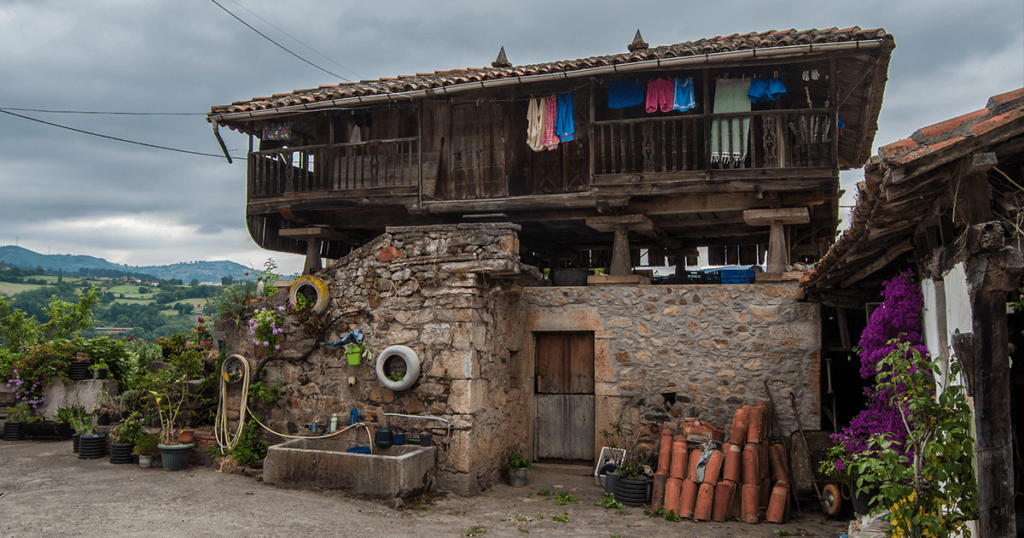
In villages in the province of Burgos in the 1960s, the custom was for children to start school at five. Not at the start of school in the fall of their fifth year, but the very day they turned five. A friend tells of waiting and waiting, with growing excitement, for his birthday on the fifth of February, peering in the windows of the village school, where in three days, then two, then the very next he would enter with the big children rather than play in the streets with the little ones. Another friend, an Asturian, tells of finally being allowed to wear long pants, like the men, and the same year being allowed to stay with the men when the women and children were preparing meals and gossiping in the kitchen. How quaint and antiquated these stories make life of 50 years ago seem.
Similar to stories from the past that reveal great changes in only a little time, are the artifacts still in place: stone huts with roof tiles held in place by rocks, doors with the lintel the height of my shoulder, old-fashioned farmhouses built to accommodate livestock on the ground floor and the family just above, to be warmed by the rising animal heat. Kitchens with a wood- or coal-burning cook stove and an old-fashioned pila, a massive rectangular stone or marble basin, more like a trough than a sink. Working wells in farmyards and stone washhouses in villages. Bars, even restaurants, where to get to the toilets you step outside and around back. All of this evidence of other times endures in plain view. But I have never seen an outhouse in this country, such as we used at a summer camp in Tennessee.
At camp the idea must have been to toughen up city girls. Another outhouse I used was at the ranch where my girlhood friends grew up, and there the idea was authenticity, I think, and the simple life, though living with no electricity and without a shower or toilet made for complications, not simplicity.
The ranch was at the end of a dirt road. On the far side of their parents’s land was national forest. No power lines, no sewer lines, no city water. But they did have running water pumped with a gasoline generator from the creek to the water tank on the house, from where it flowed down into the kitchen sink, and they did have hot baths, of the kind you take by pouring heated water into a tin tub in the kitchen. They could read at night—by kerosene lamp. Their life was dusty in summer, muddy in winter, chaotic and difficult with animals escaping and machines breaking down, and filled with inconveniences, like flies buzzing in the outhouse in summer and icy boards to sit on in winter. But their life was not backward. It was a determined choice of the parents, who still live in the same ramshackle house, and accepted by both daughters, each of whom has for some period chosen to live in a way reminiscent of her childhood.
The family didn’t live the pioneer life—no washboard down at the creek but instead a trip to the laundromat in town, though clothes were taken home and laid out to dry over scrub oak bushes. Hot showers and long baths were not unknown, just taken at friends’ houses. An old-fashioned icebox even sat in the kitchen to keep food if not cold at least cool. But the fun of remembering isn’t in the half-amenities to ease difficulties, but the difficulties themselves: collecting firewood to keep from freezing, fixing broken pumps, holding a match to the lamp wick, falling asleep at the end of day not in a bed too cold to be enticing but in the warmest corner of the living room, behind the wood stove, curled up like a cat. In the worst of the winter, when the dirt road was impassable by car, the girls rode horses to catch the school bus. The horses, stabled in the neighbors’ barn, then carried them home at the end of the school day. “And they lived that,” I marvel, “and didn’t just hear about it from grandparents!” Marvelous it seems, but not unbelievable; I was there, I saw it.
In contrast, the stories I hear about primitive conditions or backward habits common in the childhoods of Spanish acquaintances were not choices but the conditions of the time, difficult to avoid and, as soon as possible, bettered. I hardly know a person my age, with grown kids, who doesn’t recall the hard work and privations of growing up 40 and 50 years ago; they all seem astonished at the ease their children are accustomed to, and a little miffed that those kids don’t appreciate how good they have it.
Of these lives of Spanish friends, I want to double-check: “Did your mother really wash her sheets in the river in midwinter three hours after giving birth?” And “Did your parents really go off to work in Germany and leave you kids behind?” And “Did you really start school the day you turned five?”
Yes, the very day, just like everyone else, which is what made it seem the most normal thing in the world. Not, however, necessarily something honorable, authentic, or noble, and nothing he’d crave for his children. Maybe it’ll take another generation—the son raised in a city apartment or even the grandchild he doesn’t have yet—to recast the old ways as the good ways.

